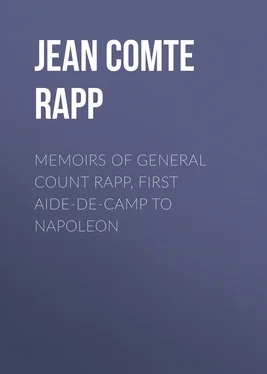Jean Comte Rapp - Memoirs of General Count Rapp, First aide-de-camp to Napoleon
Здесь есть возможность читать онлайн «Jean Comte Rapp - Memoirs of General Count Rapp, First aide-de-camp to Napoleon» — ознакомительный отрывок электронной книги совершенно бесплатно, а после прочтения отрывка купить полную версию. В некоторых случаях можно слушать аудио, скачать через торрент в формате fb2 и присутствует краткое содержание. Жанр: Биографии и Мемуары, История, foreign_edu, foreign_antique, foreign_prose, на английском языке. Описание произведения, (предисловие) а так же отзывы посетителей доступны на портале библиотеки ЛибКат.
- Название:Memoirs of General Count Rapp, First aide-de-camp to Napoleon
- Автор:
- Жанр:
- Год:неизвестен
- ISBN:нет данных
- Рейтинг книги:5 / 5. Голосов: 1
-
Избранное:Добавить в избранное
- Отзывы:
-
Ваша оценка:
- 100
- 1
- 2
- 3
- 4
- 5
Memoirs of General Count Rapp, First aide-de-camp to Napoleon: краткое содержание, описание и аннотация
Предлагаем к чтению аннотацию, описание, краткое содержание или предисловие (зависит от того, что написал сам автор книги «Memoirs of General Count Rapp, First aide-de-camp to Napoleon»). Если вы не нашли необходимую информацию о книге — напишите в комментариях, мы постараемся отыскать её.
Memoirs of General Count Rapp, First aide-de-camp to Napoleon — читать онлайн ознакомительный отрывок
Ниже представлен текст книги, разбитый по страницам. Система сохранения места последней прочитанной страницы, позволяет с удобством читать онлайн бесплатно книгу «Memoirs of General Count Rapp, First aide-de-camp to Napoleon», без необходимости каждый раз заново искать на чём Вы остановились. Поставьте закладку, и сможете в любой момент перейти на страницу, на которой закончили чтение.
Интервал:
Закладка:
I resolved to retire to Alsace, and I was making preparations for my departure, when Josephine sent to desire me to return and make my best apologies to Napoleon. Louis, however, gave me contrary advice, and I was not much inclined to obey the directions of the Empress, as my resolution was formed. Two days elapsed, and I heard no news from Saint Cloud. Some friends, among whom was Marshal Bessières, called on me. "You are in the wrong," said the Marshal, "you cannot but acknowledge it. The respect and gratitude you owe to the Emperor render it a duty to confess your fault." I yielded to these suggestions. No sooner had Napoleon received my letter, than he desired me to attend him in one of his rides on horseback. He was out of humour with me for some time; but one day he sent for me very early at Saint Cloud. "I am no longer angry with you," said he, with exceeding kindness of manner; "you were guilty of a great piece of folly; but it is all over—I have forgotten it. It is my wish that you should marry." He mentioned two young ladies, either of whom, he said, would suit me. My marriage was brought about; but unfortunately it did not prove a happy one.
Bernadotte was in the deepest disgrace, and he deserved it. I met him at Plombières, whither he had been permitted to go, accompanied by his wife and son, for the benefit of the waters; and I had visited the place for the same purpose. I had always admired Bernadotte's kind and amiable disposition. I saw him frequently at Plombières. He communicated to me the circumstance that most distressed him, and begged that I would use my influence to bring about his reconciliation with the Emperor, whom he said he had never ceased to admire, and who had been prepossessed against him by calumnious reports. On my return I learned that his friends, his brother-in-law, and Madame Julie herself, had uselessly interceded in his behalf. Napoleon would hear nothing they had to say; and his irritation against Bernadotte continually increased. But I had promised to do what I could for him; and I was bound to keep my word. The Emperor was preparing to set out for Villiers, where Murat was to give a fête : he was in high good-humour, and I determined to avail myself of this favourable circumstance. I communicated my design to Marshal Bessières, who, with myself, was to attend the Emperor: he tried to dissuade me from my intention. He informed me that Madame Julie had that very morning been at Malmaison, and that she had departed in tears for the ill success of her suit. This circumstance was not calculated to inspire me with confidence; but I nevertheless ventured on my mediation. I informed Napoleon that I had seen Bernadotte at Plombières, that he was dejected and deeply mortified by his disgrace. "He protests," added I, "that he has never failed in his love and devotion for your Majesty."—"Do not speak of him; he deserves to be shot," said Napoleon; and he set off at full gallop. At Murat's fête , I met Joseph and his wife; and I told them how unlucky I had been. The affair came to the knowledge of Bernadotte, who thanked me for my good intentions. Notwithstanding his numerous misunderstandings with Bernadotte, Napoleon subsequently forgave all his past offences, and loaded him with wealth and honours. The Prince Royal is now about to ascend the throne, while the author of his fortune is exiled to a rock in the midst of the ocean.
CHAPTER IV
It has been affirmed that Napoleon was not brave. A man who, from the rank of lieutenant of artillery, rose to be the ruler of a nation like France, could not surely be deficient in courage. Of this his conduct on the 18th Brumaire, on the 5th Nivose, and during the plot of Arena, are sufficient proofs, if proofs were wanting. He was well aware how numerous were his enemies among the jacobins and the chouans; yet every evening he walked out in the streets of Paris, and mingled with the different groups, never accompanied by more than two individuals. Lannes, Duroc, Bessières, or some of his aides-de-camp usually attended him in these nocturnal excursions. This fact was well known throughout Paris.
The affair of the infernal machine has never been properly understood by the public. The police had intimated to Napoleon that an attempt would be made against his life, and cautioned him not to go out. Madame Bonaparte, Mademoiselle Beauharnais, Madame Murat, Lannes, Bessières, the aide-de-camp on duty, and lieutenant Lebrun, now duke of Placenza, were all assembled in the saloon, while the First Consul was writing in his closet. Haydn's Oratorio was to be performed that evening: the ladies were anxious to hear the music, and we also expressed a wish to that effect. The escort picquet was ordered out; and Lannes requested that Napoleon would join the party. He consented; his carriage was ready, and he took along with him Bessières and the aide-de-camp on duty. I was directed to attend the ladies. Josephine had received a magnificent shawl from Constantinople, and she that evening wore it for the first time. "Allow me to observe, Madame," said I, "that your shawl is not thrown on with your usual elegance." She good humouredly begged that I would fold it after the fashion of the Egyptian ladies. While I was engaged in this operation, we heard Napoleon depart. "Come, sister," said Madame Murat, who was impatient to get to the theatre; "Bonaparte is going." We stepped into the carriage: the First Consul's equipage had already reached the middle of the Place Carrousel . We drove after it; but we had scarcely entered the Place when the machine exploded. Napoleon escaped by a singular chance. Saint-Regent, or his French servant, had stationed himself in the middle of the Rue Nicaise . A grenadier of the escort, supposing he was really what he appeared to be, a water-carrier, gave him a few blows with the flat of his sabre, and drove him off. The cart was turned round, and the machine exploded between the carriages of Napoleon and Josephine. The ladies shrieked on hearing the report; the carriage windows were broken, and Mademoiselle Beauharnais received a slight hurt on her hand. I alighted, and crossed the Rue Nicaise , which was strewed with the bodies of those who had been thrown down, and the fragments of the walls that had been shattered by the explosion. Neither the Consul nor any individual of his suite sustained any serious injury. When I entered the theatre Napoleon was seated in his box, calm and composed, and looking at the audience through his opera-glass. Fouché was beside him. "Josephine," said he, as soon as he observed me. She entered at that moment, and he did not finish his question. "The rascals," said he, very coolly, "wanted to blow me up. Bring me a book of the Oratorio."
The audience soon learned the danger he had escaped, and they saluted him with testimonies of the deepest interest. These, I think, are unequivocal proofs of courage. The men who have followed him on the field of battle, cannot be at a loss to quote many more.
CHAPTER V
Napoleon, whatever his detractors may say, was neither overbearing nor obstinate in his opinions. He was eager to obtain information, and he wished to hear the opinions of all who were entitled to hold any. Among the members of the Council, the wish to please him sometimes superseded every other consideration; but when he perceived this, he never failed to restore the discussion to its proper tone. "Gentlemen," he would say to his lieutenants, "I summoned you here, not to bring you over to my opinion, but to let me hear your's. Explain to me your views; and I shall see whether the plans which you propose are better than my own."
While we were at Boulogne, he gave a lesson of this kind to the minister of the Marine. He had proposed some questions, to which M. Decrès replied only by a string of compliments. Napoleon wrote to him thus:—"I beg you will send me, in the course of to-morrow, a memorial on the following question: In the present state of affairs, what is most proper to be done, should Admiral Villeneuve remain at Cadiz? Raise your mind to the importance of present circumstances, and the situation in which France and England are placed. Send me no more letters like that which you addressed to me yesterday; they can answer no purpose. I have but one wish, and that is, to succeed; for which, I pray God," &c.
Читать дальшеИнтервал:
Закладка:
Похожие книги на «Memoirs of General Count Rapp, First aide-de-camp to Napoleon»
Представляем Вашему вниманию похожие книги на «Memoirs of General Count Rapp, First aide-de-camp to Napoleon» списком для выбора. Мы отобрали схожую по названию и смыслу литературу в надежде предоставить читателям больше вариантов отыскать новые, интересные, ещё непрочитанные произведения.
Обсуждение, отзывы о книге «Memoirs of General Count Rapp, First aide-de-camp to Napoleon» и просто собственные мнения читателей. Оставьте ваши комментарии, напишите, что Вы думаете о произведении, его смысле или главных героях. Укажите что конкретно понравилось, а что нет, и почему Вы так считаете.












